November 5, 2018 •
Anne Arundel County Ethics Bill Signed by County Executive
On October 15, 2018, the Anne Arundel County Council passed a public ethics bill originally proposed by County Executive Steve Schuh. Bill No. 80-18 increases late filing fees for lobbyists and employees, adds a revolving door provision, modifies certain definitions, […]
 On October 15, 2018, the Anne Arundel County Council passed a public ethics bill originally proposed by County Executive Steve Schuh.
On October 15, 2018, the Anne Arundel County Council passed a public ethics bill originally proposed by County Executive Steve Schuh.
Bill No. 80-18 increases late filing fees for lobbyists and employees, adds a revolving door provision, modifies certain definitions, requires employee ethics training, and creates changes to comply with state ethics laws, among other provisions.
The bill also updates who is required to file financial disclosure statements.
The bill was signed by Schuh and will be effective on December 6, 2018.
November 2, 2018 •
Ethics Ballot Measure up for Vote in Long Beach, California
The city of Long Beach, California has a measure to amend the city’s charter on Tuesday’s ballot. Measure CCC seeks to create an independent ethics commission charged with administering and implementing rules concerning campaign finance, lobbying, conflicts of interest and […]
 The city of Long Beach, California has a measure to amend the city’s charter on Tuesday’s ballot.
The city of Long Beach, California has a measure to amend the city’s charter on Tuesday’s ballot.
Measure CCC seeks to create an independent ethics commission charged with administering and implementing rules concerning campaign finance, lobbying, conflicts of interest and governmental ethics.
Critics of the measure argue that the mayor and auditor’s appointment privilege signifies that the commission would not be sufficiently independent.
November 2, 2018 •
NYCU Video Digest – November 2, 2018
Got a minute?! (and a 1/2) Here are four stories from this week in campaign finance and advocacy that you don’t want to miss.
Got a minute?! (and a 1/2) Here are four stories from this week in campaign finance and advocacy that you don’t want to miss.
November 2, 2018 •
New Hampshire Attorney General Issues Letter on Campaign Finance
Earlier this year, the New Hampshire Attorney General Gordon MacDonald issued a letter to the Office of Secretary of State advising on his interpretation of some aspects of the state’s campaign finance laws. Most notably, a footnote in the letter […]
 Earlier this year, the New Hampshire Attorney General Gordon MacDonald issued a letter to the Office of Secretary of State advising on his interpretation of some aspects of the state’s campaign finance laws.
Earlier this year, the New Hampshire Attorney General Gordon MacDonald issued a letter to the Office of Secretary of State advising on his interpretation of some aspects of the state’s campaign finance laws.
Most notably, a footnote in the letter indicated MacDonald could require corporations making contributions in the state to register and report as political committees.
Under current state law, political committee registration is required for organizations making expenditures of $5,000 or more annually, even if the organization does not have as its major purpose to promote the success or defeat of candidates or measures. This regulation has been in place for several years during which corporate registration has not been the practice.
There is an exception to registration for organizations registered as business entities, but additional guidance on who qualifies as a business entity has not yet been made available.
Though there has been no change in the law to trigger a change in enforcement, MacDonald has indicated he is ramping up enforcement of campaign finance violations.
November 2, 2018 •
U.S. Virgin Islands Announces Special Election
Lawmakers convened and adjourned two special sessions regarding a proposal for tuition-free college education and to vote on a reapportionment initiative. The Legislature approved Bill 32-0329 to schedule a special election for March 30, 2019. The election will allow voters […]
 Lawmakers convened and adjourned two special sessions regarding a proposal for tuition-free college education and to vote on a reapportionment initiative.
Lawmakers convened and adjourned two special sessions regarding a proposal for tuition-free college education and to vote on a reapportionment initiative.
The Legislature approved Bill 32-0329 to schedule a special election for March 30, 2019.
The election will allow voters to decide whether to restructure the Legislature to create smaller district senators and increase the number of at-large senators.
November 2, 2018 •
News You Can Use Digest – November 2, 2018
National: ‘My Comrades Will Kill You’: Pipe bombs sent in year of many death threats against politicians Governing – Alan Greenblatt | Published: 10/25/2018 Political violence has dominated the news recently, with pipe bombs mailed to CNN’s New York office […]

National:
‘My Comrades Will Kill You’: Pipe bombs sent in year of many death threats against politicians
Governing – Alan Greenblatt | Published: 10/25/2018
Political violence has dominated the news recently, with pipe bombs mailed to CNN’s New York office and prominent Democrats, as well as liberal donor George Soros and actor Robert De Niro. Threats of violence have become commonplace in American politics. New Jersey Rep. Jay Webber, a Republican candidate for Congress, received a note calling him a liar and a “scumbag” and threatening him and his children. “You BETTER hope that you don’t win! Or else,” the note read. “How many kids do you have…7? Unlucky 7. This is what we think of you. Time to get out of politics!” In a year when record numbers of women are running for office, many have been harassed or become targets of sexist or threatening remarks.
Voters Could Clamp Down on Ethics, Campaign Finance at The Ballot Box
National Public Radio – Peter Overby | Published: 10/30/2018
Voters in more than a dozen states will consider ballot measures on November 6 that would affect ethics and campaign finance reform. Some of the initiatives would exceed federal standards, which have been steadily relaxed by the U.S. Supreme Court. Congress last passed a major campaign finance bill in 2001. “It’s telling that we have so many challengers for Congress that are running on this issue,” said Larry Norden of New York University’s Brennan Center for Justice. “But to get real change now, the only way to do that is at the local and the state level.”
Federal:
How ActBlue Is Trying to Turn Small Donations into a Blue Wave
Center for Public Integrity – Carrie Levine and Chris Zubak-Skees | Published: 10/25/2018
ActBlue, a nonprofit whose online fundraising tools have been used to varying degrees by nearly every Democrat running for Congress, says it has raised more than $2.9 billion for Democrats and progressive organizations since its founding in 2004. September 2018 was the biggest month in its history. Donors are using the platform to reshape the map of competitive races this year, becoming a powerful force that could sway Democratic politics beyond November’s election.
Mueller Refers Sex Misconduct Scheme Targeting Him to FBI for Investigation
NBC News – Brandy Zadrozny, Ben Collins, and Tom Winter | Published: 10/30/2018
Special counsel Robert Mueller has asked the FBI to investigate an alleged scheme to manufacture sexual assault stories about him. At issue is an email widely circulated among journalists from someone who claimed she had been approached with an offer to pay her tens of thousands of dollars if she would answer questions about Mueller and then sign a sworn affidavit accusing him of sexual misconduct and workplace harassment. The plot appeared to be the latest, and one of the more bizarre, in a string of attempts by supporters of President Trump to discredit Mueller’s investigation as a hoax and a witch hunt.
From the States and Municipalities:
Alaska: Begich Spent Four Years as a Consultant. As Governor, He Could Sign Bills Affecting Former Clients.
KTOO – Nathaniel Herz | Published: 10/30/2018
For nearly four years, Mark Begich has owned a public affairs and consulting firm, Northern Compass Group, which has worked with clients that intersect with both state and federal government. If Begich is elected as Alaska’s governor on November 6, he will likely be faced with decisions that will directly affect the businesses, unions, and Native organizations that have been paying his business for advice. Alaska politicians often emerge from the worlds of public policy and business, and Begich is far from the first with potential for conflicts. Begich’s work is significant, though, because of the number of clients he has had, as well as the recentness of his work, said state Rep. Jason Grenn, who helped lead a successful push for legislative ethics reforms this year.
Arizona: Arizona Commissioner Andy Tobin Texted APS Lobbyists Frequently, Including About Open Rate Case
Energy Policy Institute – David Pomerantz | Published: 10/29/2018
Arizona Corporation Commission (ACC) member Andy Tobin exchanged text messages throughout 2018 with lobbyists from Arizona Public Service (APS), often to complain about negative media coverage of APS’ rate increase requests before the commission. On one occasion, Tobin asked an APS lobbyist whether the utility had a “public information strategy planned” to combat negative media coverage of a rate increase request while the case was still pending before Tobin and the commission. The ACC, which is supposed to regulate APS in the public’s interest, has been embattled by scandals for the past four years, ever since two non-profit “dark money” organizations spent $3 million on the ACC elections in 2014. APS never confirmed nor denied being the source of that money.
Maine: Pro-Offshore Oil Group Chaired by LePage Is Run by Energy Lobbyists
Biddeford Journal Tribune – Colin Woodward (Portland Press Herald) | Published: 10/28/2018
A coalition of governors headed by Maine Gov. Paul LePage that seeks to open most federal waters to oil and gas exploration is staffed by employees of an oil industry lobbying firm. The Outer Continental Shelf Governors Coalition, which LePage joined in 2015 and has chaired for the past two years, outsources its day-to-day staffing, research, and communications tasks to an advocacy group purporting to represent energy consumers. But a closer look at the group, the Consumer Energy Alliance, reveals it is funded by energy producers and staffed and run by senior officials of HBW Resources, an energy-focused lobbying and consulting firm.
Maryland: Question G Would Undercut Independence of Baltimore Ethics Board, Chairwoman Says
Baltimore Brew – Mark Ruettner | Published: 10/31/2018
Question G on the November ballot in Baltimore would tether the director of Legislative Reference to the mayor and city council president. The director of Legislative Reference is also the chief advisor to the city Board of Ethics. By making the director an “at will” employee of Mayor Catherine Pugh and Council President Bernard Young, as Question G does, that same employee is placed in a very awkward position on the ethics board. “Our director may be faced with having to handle an ethics complaint against one of the two people who appointed him,” said board Chairperson Linda Pierson.
Montana: How Big Sky Country Became the Front Line in a Long Battle Over Dark Money
Yahoo! News – Christa Case Bryant | Published: 10/29/2018
Two women are central figures in a fight in Montana over money in politics, one that may well set the tone for the rest of the nation. Jamie MacNaughton is the sole lawyer at the office of the Commissioner of Political Practices, which is tasked with enforcing Montana’s strict campaign finance laws. She is helping to prepare two cases under consideration by the U.S. Supreme Court. Anita Milanovich serves as the Montana outpost for the Bopp Law Firm, which is led by the preeminent lawyer fighting campaign finance regulations across the country. Now the firm is pursuing the legal cases against MacNaughton’s office.
Oklahoma: Legislators Act As ‘Super Donors,’ Sending Their Own Donors’ Cash to Other Candidates
KGOU – Trevor Brown (Oklahoma Watch) | Published: 10/30/2018
A review of contributions in Oklahoma found sitting lawmakers and legislative candidates’ campaigns have given more than $746,000 to other legislative candidates since January 1, 2016. About 75 percent of the money came from about a dozen Republican and Democratic legislators, almost all of whom hold or have held leadership positions. The sharing of contributions means these lawmakers act as de facto “super donors,” or at least bundlers, who dole out thousands of dollars to candidates running in a wide range of races. The large amounts of circulating cash have raised concerns at the Oklahoma Ethics Commission, which is examining a possible rule change, still being drafted, that would block candidates from transferring campaign funds to other candidates.
Pennsylvania: State Rep. Vanessa Brown Guilty on All Counts; Took $4,000 Bribe in Sting
Philadelphia Inquirer – Craig McCoy | Published: 10/31/2018
A jury convicted Pennsylvania Rep. Vanessa Lowery Brown of charges she accepted $4,000 in cash from an undercover informant. Brown was the last defendant in an ambitious and controversial sting investigation launched by state prosecutors nearly a decade ago but secretly ended by then-state Attorney General Kathleen Kane. The guilty verdict represented the most dramatic repudiation yet of Kane’s criticism of the sting, which she had contended could not produce winnable cases in court. Under the law, Brown, who is running unopposed in the November 6 election, will also be barred from her House post upon her sentencing.
South Carolina: SC Rep. Harrison Found Guilty in Public Corruption Case, Gets Prison Sentence
Greenville News – John Monk (The State) | Published: 10/27/2018
A jury found former South Carolina Rep. Jim Harrison guilty of perjury and misconduct in office, marking the fifth conviction of a legislator in the past four years and capping off the first trial to come out of the high-profile probe into corruption in the statehouse. Prosecutors accused Harrison of secretly profiting from an influential consulting firm that pleaded guilty to illegal lobbying earlier this year. That firm, Richard Quinn & Associates, has been at the center of the five-year corruption investigation because of its once sprawling network of lawmakers, lobbying interests, and corporate clients. Harrison, the former chairperson of the House Judiciary Committee, was sentenced to 18 months in prison.
West Virginia: For a Groundbreaking Candidate in West Virginia, Big Money and Attention Come with Downsides
Washington Post – Greg Jaffe | Published: 11/1/2018
Back when his campaign had raised just $7,000, when just about anyone who knew anything about politics gave him zero chance of winning, West Virginia Sen. Richard Ojeda decided to make a campaign video for his run for Congress. The pivotal moment for Ojeda came near the end of the shoot when he gave out his personal cell phone number. Ten months later, Ojeda was driving past burned-out houses and abandoned storefronts in the coal town where he had spent his childhood and still lived. The polls had him neck and neck with his Republican opponent. It was 21 days until the election and his cellphone was now ringing 100 times a day with calls from all over the United States and the world. At a moment in American politics when authenticity is everything, Ojeda is being hailed as an unpolished, authentic voice.
Wisconsin: Last-Minute Surprises and Secretive Moves Hide Wisconsin Lawmakers’ Actions from Public View
Wisconsin Public Radio – CV Vitolo-Haddad and Dee Hall (Wisconsin Center For Investigative Journalism) | Published: 10/29/2018
Since voters swept Republicans into power in 2010, Wisconsin lawmakers have increasingly used secretive maneuvers to keep the public in the dark about major spending and policy changes. An investigation found the Legislature systematically diminishes the voices of the public by Introducing budget amendments at the end of the approval process with no public notice or debate; approving anonymous, last-minute budget motions containing changes, including major policy items that have nothing to do with state spending; and altering the scope and impact of a bill after its public hearing has been held, which excludes citizens from having influence on legislation before it is enacted. When Democrats controlled the Legislature and governor’s office they played that game, too, notably with their own end-of-the-session wrap-up budget bills of anonymously authored items.
October 31, 2018 •
New York to Launch New Lobbyist Reporting System
The Joint Commission on Public Ethics will be launching a new online lobbying reporting system to coincide with the new lobbying regulations, effective January 1, 2019. The new system is expected to launch in November. Reports covering 2018 must be […]
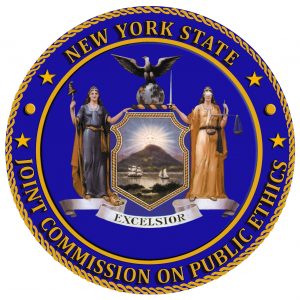 The Joint Commission on Public Ethics will be launching a new online lobbying reporting system to coincide with the new lobbying regulations, effective January 1, 2019. The new system is expected to launch in November.
The Joint Commission on Public Ethics will be launching a new online lobbying reporting system to coincide with the new lobbying regulations, effective January 1, 2019. The new system is expected to launch in November.
Reports covering 2018 must be submitted though the current system.
All filings covering 2019 activity, including registration and reportable business relationship forms, must be submitted through the new system.
Registrations for the 2019-20 biennial period may be submitted through the new system in early December.
The Commission will inform users when the registration function becomes available.
October 30, 2018 •
Washington D.C. Campaign Finance Reform Addresses Pay-to-Play
The Washington D.C. Council Committee on the Judiciary and Public Safety unanimously passed a bill that aims to restrict political contributions by government contractors doing business with the district. The bill also addresses improper coordination between campaigns, political action committees […]
 The Washington D.C. Council Committee on the Judiciary and Public Safety unanimously passed a bill that aims to restrict political contributions by government contractors doing business with the district.
The Washington D.C. Council Committee on the Judiciary and Public Safety unanimously passed a bill that aims to restrict political contributions by government contractors doing business with the district.
The bill also addresses improper coordination between campaigns, political action committees and independent expenditure committees.
The pay-to-play component of the bill would ban campaign contributions by businesses seeking contracts of $250,000 or more.
If passed by the full council, the bill is subject to appropriation and, if funded, would take effect on October 1, 2019.
Pay-to-play provisions would take effect after the November 2020 general election.
October 26, 2018 •
News You Can Use Digest – October 26, 2018
National: How a Billionaire from Another State Could Influence Your Elections Center for Public Integrity – Liz Essley Whyte | Published: 10/18/2018 Twenty-five American billionaires have invested more than $70.7 million for initiative campaigns this year in 19 states where […]

National:
How a Billionaire from Another State Could Influence Your Elections
Center for Public Integrity – Liz Essley Whyte | Published: 10/18/2018
Twenty-five American billionaires have invested more than $70.7 million for initiative campaigns this year in 19 states where they do not reside. Meanwhile, as little as $7.2 million has gone from their wallets and those of other billionaires to campaigns in their home states. In total, the $78 million tally from all 34 billionaires may be pocket change to them, but it is more than 10 percent of the $648 million disclosed so far this year for statewide ballot measure campaigns. The contributions from the wealthy to campaigns across state lines rankle some local opponents, even though no one questions their legality. Just who should decide issues in their states, they ask – the people who live there or some rich folks from out-of-state?
Three Secretaries of State Are Refereeing the Election While Running in the Field
McClatchy DC – Tim Johnson | Published: 10/18/2018
In three states, the referee for the midterm elections is also on the field as a player. Elected secretaries of state in Georgia and Kansas, who in their official capacities oversee the elections in their states, are running for governor. Ohio’s secretary of state is running for lieutenant governor. They have faced scattered calls to resign but have refused to do so. Election reformers say the situation underscores the conflict-of-interest when an official has responsibilities for an election while also running as a candidate. While the three secretaries of state are Republican, concerns about inappropriate actions by partisans who hold the office transcend parties.
Federal:
Inside the Saudis’ Washington Influence Machine: How the kingdom gained power through fierce lobbying and charm offensives
MSN – Tom Hamburger, Justin Reinhard, and Justin Moyer (Washington Post) | Published: 10/21/2018
A sophisticated influence machine has shaped policy and perceptions of Saudi Arabia in Washington, D.C. for decades, batting back critiques of the kingdom by doling out millions of dollars to lobbyists, law firms, prominent think tanks, and large defense contractors. In 2017, Saudi payments to lobbyists and consultants in Washington more than tripled over the previous year. Beyond their spending, the Saudis have enjoyed a priceless advantage: a warm relationship with President Trump, who has done business its wealthy citizens, and his son-in-law, Jared Kushner, who developed a close bond with the crown prince as he crafted the administration’s Middle East policy.
U.S. Begins First Cyberoperation Against Russia Aimed at Protecting Elections
MSN – Julian Barnes (New York Times) | Published: 10/23/2018
The United States Cyber Command is targeting individual Russian operatives to try to deter them from spreading disinformation to interfere in elections, telling them that American operatives have identified them and are tracking their work. The campaign, which includes missions undertaken in recent days, is the first known overseas cyberoperation to protect U.S. elections, including the November midterms. The operations come as the Justice Department recently outlined a campaign of “information warfare” by Russians aimed at influencing the midterm elections, highlighting the broad threat the American government sees from Moscow’s influence campaign.
From the States and Municipalities:
Alaska: State Regulators to Alaska Lobbyist: Stop helping candidates raise money
Alaska Public Media – Nathaniel Hertz | Published: 10/18/2018
Alaska lobbyists have been breaking an anti-corruption law by promoting fundraising events on behalf of candidates, according to a preliminary opinion from the state’s campaign finance watchdog. Lobbyist Ashley Reed asked for the formal opinion from the Alaska Public Offices Commission. He wanted to know whether state law allows for lobbyists to email copies of invitations to fundraisers for political candidates. The Legislature banned lobbyists from engaging in fundraising activity more than two decades ago. But despite the ban, Reed and lobbyist Jerry Mackie have been sending copies of fundraiser invitations to their clients and friends.
Florida: Text Messages Raise New Questions Over Andrew Gillum’s Lobbyist Connections
WRAL – Patricia Mazzei (New York Times) | Published: 10/23/2018
Undercover FBI agents paid for Tallahassee Mayor Andrew Gillum’s hotel room and his ticket to the Broadway musical “Hamilton” during a 2016 trip to New York City, according to newly released documents that raise questions just before Florida’s gubernatorial election, in which Gillum is locked in a close race with former U.S. Rep. Ron DeSantis. Text messages between Gillum and former lobbyist Adam Corey, who set up meetings with the agents, show Gillum knew the tickets came from men he believed to be businesspeople looking to develop property in Tallahassee, but were undercover FBI agents investigating public corruption in the city. The records contradicted Gillum’s past statements on the state ethics probe.
Indiana: No Charges Against Hill, But Investigation Reveals Searing New Details
Indianapolis Star – Tony Cook, Ryan Martin, and Kaitlin Lange | Published: 10/23/2018
Indiana Attorney General Curtis Hill will not be charged over allegations he groped a state lawmaker and several staffers at a party celebrating the end of the legislative session. He also was cleared of any ethical breaches by the inspector general’s office. Special Prosecutor Daniel Sigler, who said he believed the women’s stories to be “true and credible,” announced that bringing charges would be difficult due to the time that elapsed between the alleged incident in March and the filing of the claims against Hill. But the fallout from Hill’s alleged behavior that night is likely to continue as his accusers prepare a civil lawsuit and Republican leaders continue to call for his resignation.
Kentucky: Kentucky AG Defends Campaign Finance Reform in Sixth Circuit
Courthouse News Service – Kevin Koeninger | Published: 10/18/2018
The constitutionality of several Kentucky ethics laws was debated before a panel of the U.S. Court of Appeals for the Sixth Circuit, with the state’s attorney general arguing they are necessary to maintain citizens’ confidence in the government. Plaintiffs alleged numerous restrictions on campaign financing and lobbying were unconstitutional, including contribution limits and a prohibition on gifts to legislators and their spouses. Kentucky made sweeping changes to its campaign finance laws in 2017, which mooted several of the plaintiffs’ claims. But U.S. District Court Judge William Bertelsman sided with the plaintiffs on several issues last year. Bertelsman struck down the law that prevents legislators and their spouses from receiving “anything of value,” ruling the statute was unconstitutionally vague and overbroad.
Maine: Crowdfunding of Collins Opponent in 2020 Likely Faces Legal Challenge
Lewiston Sun Journal – Kevin Collins (Portland Press Herald) | Published: 10/22/2018
In an effort to pressure U.S. Sen. Susan Collins on the confirmation of Brett Kavanaugh to the Supreme Court, organizers pledged to collect contributions nationwide and give them to a hypothetical Democratic challenger in 2020 if Collins voted to confirm the nominee. If she opposed Kavanaugh, whose nomination nearly collapsed amid allegations of sexual misconduct, no money would be collected. The unprecedented campaign, which Collins has labeled a bribe, is a testament to the power of small-dollar “crowdfunding” at a time when corporations, interest groups, and wealthy donors can dump unlimited money into elections. Yet the tactics used by the three organizations behind the campaign to pressure Collins are raising sticky legal questions that could end up in court, with national implications.
Missouri: Clean Missouri Proposition Puts Redistricting Front and Center, Limits Lobbyist Influence
St. Louis Public Radio – Jason Rosenbaum | Published: 10/23/2018
Amendment 1 on the November ballot in Missouri would limit the meals, entertainment, and travel a lobbyist can give a lawmaker, and place a two-year waiting period on lawmakers and their staff to become lobbyists. It would also lower contributions limits for state House and Senate candidates, as well as alter how state legislative districts are drawn. Supporters believe the measure will make lawmakers more responsive to people instead of special interest groups or lobbyists. Detractors believe the initiative is not about improving ethics, and instead is about giving Democrats a leg up on the state legislative redistricting process.
New Hampshire: N.H. Legislators Look to Lobbyists for Reliable Source of Re-Election Cash
New Hampshire Public Radio – Casey McDermott | Published: 10/19/2018
A review of fundraising reports in New Hampshire over the most recent legislative session shows donations from lobbying interests with a direct stake in the decisions made by state senators accounted for roughly half of all the money raised by those same senators’ re-election campaigns. The rate of reliance on lobbying money varied from as little as 16 percent to 75 percent or more. In many cases, senators’ fundraising reports reflected the intersection of money and influence inherent to statehouse lobbying. Candidates can, and often do, accept separate contributions from lobbying firms, the lobbyists they employ, and the clients they represent, magnifying their impact in legislative races.
New York: Dean Skelos, Ex-New York Senate Leader, Gets 4 Years and 3 Months in Prison
WRAL – Benjamin Weiser and Vivian Wang (New York Times) | Published: 10/24/2018
Former New York Senate Majority Leader Dean Skelos was sentenced to four years and three months in prison on federal corruption charges, including soliciting bribes and defrauding the public. The sentence was lighter than the five years that the same judge imposed in 2016 when he was convicted on the same charges. That conviction was overturned. Skelos’ son, Adam, who was convicted along with his father, was sentenced to four years in prison. Prosecutors accused Dean Skelos of using his position to pressure three companies to provide his son with consulting work, a “no-show” job, and a $20,000 payment.
North Dakota: All of the Above? The Ancient Voting Method One City Might Adopt
Governing – Alan Greenblatt | Published: 10/19/2018
In November, voters in Fargo, North Dakota, will decide whether to adopt a ballot measure that would create a system known as “approval voting” for local elections. Under the system, everybody can vote for as many candidates as they would like. If there are four candidates for the city commission, for example, you could choose to vote for one of them, or for two, or for the whole lot. Unlike the other multiple-choice method known as ranked-choice voting, which is gaining favor in some places, each vote would count the same. The person with the highest total would win. Supporters say voters would not have to worry about wasting votes on spoilers with little chance of winning since they can also select candidates expected to be more popular. In theory, however, candidates with extreme viewpoints would have a harder time since the winner would have to be broadly acceptable to most voters.
Pennsylvania: Ex-Allentown Mayor Gets 15 Years in Prison on Corruption Charges
Philadelphia Inquirer – Associated Press | Published: 10/23/2018
Former Allentown Mayor Ed Pawlowski was sentenced to 15 years in prison on corruption charges. He was convicted of trading city contracts for campaign donations to fund his bids for mayor, governor, and U.S. Senate. Jurors found him guilty on 47 counts in connection to eight schemes, including those involving contracts for a city pool, tax collection service, cybersecurity, and streetlight installation. Pawlowski must also pay more than $93,000 in restitution in restitution to the city and to vendors that prosecutors say were cheated out of a fair and open bidding process.
South Carolina: Should SC Roads Be Named After Lawmakers Who Have Pleaded Guilty to Corruption?
The State – Avery Wilks | Published: 10/22/2018
A few days after he resigned from the South Carolina Senate and pleaded guilty to misconduct in office, John Courson asked the Department of Transportation to remove the signs bearing his name from a state road. But another former state senator, Robert Ford, who pleaded guilty to corruption in 2015, says he earned the right to have a Charleston road named after him and would not give up the honor. Unseemly exits from the South Carolina General Assembly can create a host of awkward circumstances. Among them: what to do with the state roads or buildings named after politicians who have admitted to corruption?
Next month, Massachusetts voters will decide on a ballot measure seeking to cap corporate spending in elections. Ballot Question 2, if passed, will create a commission made up of citizens tasked with producing a report on the state of political […]
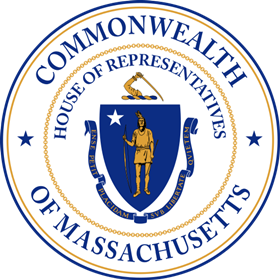 Next month, Massachusetts voters will decide on a ballot measure seeking to cap corporate spending in elections.
Next month, Massachusetts voters will decide on a ballot measure seeking to cap corporate spending in elections.
Ballot Question 2, if passed, will create a commission made up of citizens tasked with producing a report on the state of political spending in Massachusetts and promoting an amendment to the United States Constitution. The commission would also report on whether the state can legally limit corporate contributions.
The ballot measure has been characterized as a way for the state to show their opposition to the Supreme Court’s 2010 Citizens United decision.
The group advocating for Ballot Question 2 envisions a 28th Amendment removing the ability of corporations, labor unions, super PACs and other wealthy interests from financially influencing political campaigns.
To pass, an amendment to the U.S. Constitution would require approval by two-thirds of the U.S. House and Senate and must also be ratified by 38 states.
October 25, 2018 •
We Are for the Child
The CASA Board Volunteer Association of Summit County held its annual fundraiser, “I Am for the Child” breakfast on October 25, 2018. The CASA/GAL (Court Appointed Special Advocates/Guardian ad Litem) Program of Summit County is a trained community of volunteers […]
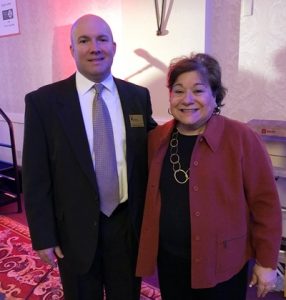 The CASA Board Volunteer Association of Summit County held its annual fundraiser, “I Am for the Child” breakfast on October 25, 2018. The CASA/GAL (Court Appointed Special Advocates/Guardian ad Litem) Program of Summit County is a trained community of volunteers appointed by a judge to represent the best interest of an abused or neglected child in court. State and Federal Communications was proud to be one of the sponsors.
The CASA Board Volunteer Association of Summit County held its annual fundraiser, “I Am for the Child” breakfast on October 25, 2018. The CASA/GAL (Court Appointed Special Advocates/Guardian ad Litem) Program of Summit County is a trained community of volunteers appointed by a judge to represent the best interest of an abused or neglected child in court. State and Federal Communications was proud to be one of the sponsors.
State and Federal Communications’ very own Research Manager Michael Beckett has been serving as chairman of the CASA Board. Beckett led the breakfast event with the compelling story of the many children in Summit County who need the services of CASA. This year’s focus was on the shocking problem of human trafficking in our own community.
“We had a great morning celebrating Signet’s David Bouffard as the 2018 Kannel Child Advocate of the Year and learning about how we can help victims of human trafficking here in Summit County. The immediate goal of the CASA/GAL Program is to provide each child victim of abuse and neglect with a trained CASA volunteer,” said Beckett. “Thank you to Elizabeth Bartz and State and Federal Communications for facilitating and supporting my involvement with the CASA Board.”
Thank you, Michael Beckett and all of the CASA volunteers for the terrific work you are doing for the children of Summit County!
Pictured: State and Federal Research Manager Michael Beckett and President and CEO Elizabeth Z. Bartz
October 25, 2018 •
Missouri Ballot Initiative to Amend Lobbying, Campaign Finance Laws
Missouri voters in the November 6 election will decide on Constitutional Amendment One, which seeks to change campaign contribution limits, gift laws, and the rules for political action committees. If passed, Amendment One would impose new contribution limits for candidates […]
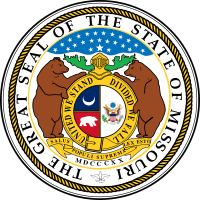 Missouri voters in the November 6 election will decide on Constitutional Amendment One, which seeks to change campaign contribution limits, gift laws, and the rules for political action committees.
Missouri voters in the November 6 election will decide on Constitutional Amendment One, which seeks to change campaign contribution limits, gift laws, and the rules for political action committees.
If passed, Amendment One would impose new contribution limits for candidates to the Missouri House and Senate. Currently, individuals and committees can contribute no more than $2,600 per election to such candidates. Amendment One would establish a limit of $2,500 for state Senate and $2,000 for state House candidates and would prevent political action committees from circumventing those limits.
Under the proposed ballot initiative, legislators and legislative employees would be banned from accepting gifts of more than $5 from lobbyists. Amendment One would also prohibit elected members and employees of the General Assembly from working as lobbyists until two years after they leave the General Assembly. Additionally, the measure would bar political fundraising on state property.
Clean Missouri is leading the campaign in support of Amendment One. The Missourians First and Advance Missouri PACS have registered to oppose Amendment One.
October 25, 2018 •
North Dakota Ethics Policy Finalized
North Dakota Gov. Doug Burgum finalized an ethics policy that applies to the governor, lieutenant governor, and employees of the governor’s office. According to the new policy, lobbyists who request a meeting with the governor’s office will be encouraged to […]
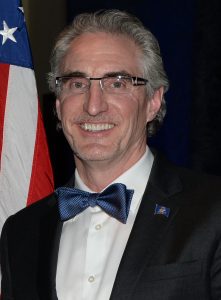 North Dakota Gov. Doug Burgum finalized an ethics policy that applies to the governor, lieutenant governor, and employees of the governor’s office.
North Dakota Gov. Doug Burgum finalized an ethics policy that applies to the governor, lieutenant governor, and employees of the governor’s office.
According to the new policy, lobbyists who request a meeting with the governor’s office will be encouraged to bring a principal of his or her client to the meeting. The policy also addresses conflicts of interests and gifts and honoraria.
No gift of any value may be accepted if offered with the intent to directly or indirectly influence the exercise of official action.
Any gift greater than $50 must be reported to the ethics officer and returned to the donor or given to charity.
October 25, 2018 •
Georgia Governor Announces Special Session
Gov. Nathan Deal announced a special session for November 13 regarding the costs associated with Hurricane Michael. The hurricane lead to deaths and destruction of property in southwest Georgia last month. The governor’s office expects the recovery costs to be […]
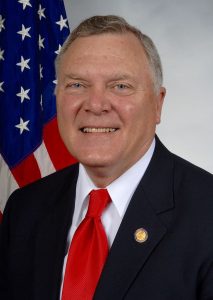 Gov. Nathan Deal announced a special session for November 13 regarding the costs associated with Hurricane Michael.
Gov. Nathan Deal announced a special session for November 13 regarding the costs associated with Hurricane Michael.
The hurricane lead to deaths and destruction of property in southwest Georgia last month.
The governor’s office expects the recovery costs to be more than $100 million.
The legislature will also vote on an executive order passed by Gov. Deal last July suspending the collection of sales tax on jet fuel.
State and Federal Communications, Inc. provides research and consulting services for government relations professionals on lobbying laws, procurement lobbying laws, political contribution laws in the United States and Canada. Learn more by visiting stateandfed.com.


